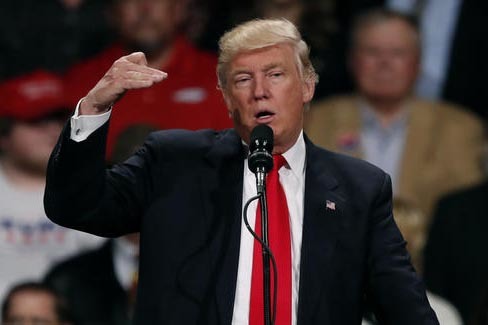
Nuclear waste shipments to a proposed repository at Yucca Mountain would traverse within a mile of President-elect Donald Trump’s hotel on the Las Vegas Strip if the project moves forward, officials said.
The Trump Hotel, located on the Las Vegas Strip, sits within 0.5 mile to a mile of the route that would be used to transfer tons of highly-radioactive nuclear waste shipments to Yucca Mountain, Robert Halstead, director of the Nevada Agency for Nuclear Projects said.
“The Trump property is within what we call the 800-meter region of influence for routine radiation. What that means is the Trump Hotel and other major properties are not only within the area where evacuation planning would be to take place, but it’s also within the 800-meter range where gamma radiation travels and where we do routine dose calculations,” Halstead said.
Halstead said there hasn’t been a formal comment from Trump on the issue of Yucca Mountain.
“As of this morning, we have not heard a formal comment from the president-elect,” he told the Nevada Commission on Nuclear Projects at a meeting on Friday.
Halstead said Trump made statements during his campaign visits to Nevada where he said that “he was concerned about the safety issues because of the proximity of Yucca Mountain to Las Vegas.”
Nevada officials restated their opposition to Yucca Mountain amid speculations about a restart of the licensing proceedings for a proposed repository.
Halstead said the state of Nevada’s strategy for responding to a restart of the licensing proceeding is the same as it was in 2013 when the U.S. Court of Appeals for the District of Columbia Circuit ordered the Nuclear Regulatory Commission to resume the licensing proceedings with their available limited funds.
“The agency and the attorney general’s office, our legal team, our expert team are prepared to adjudicate the 218 contentions or challenges that have been admitted by the NRC licensing board, and we are prepared to submit an additional 20 to 30 contentions within 30 days of a resumption of the proceeding,” Halstead said.
The 218 admitted contentions challenge all major aspects of Department of Energy’s license application that include transportation, safety, pre-closure safety, or the safety of surface facilities and the post-closure safety.
Nicholas Trutanich, Attorney General Adam Laxalt’s chief of staff said his office along with the Nevada Agency for Nuclear Projects have sought essential legislative support for Nevada’s efforts to put to rest “the proposed $90-billion poster child for federal overreach.”
“We are optimistic that this ill-conceived project will never be authorized,” Trutanich said.
The Yucca Mountain project was presumed dead after in 2010, the Obama administration scrapped plans to store tons of nuclear waste in it at the urging of then-U.S. Senate Majority Leader Harry Reid.
The DOE’s Yucca Mountain program no longer exists. Halstead said it would be “legally and financially difficult” for DOE to restart that program.
In addition, the land withdrawal that the DOE had to the Yucca Mountain site and land withdrawals for the rail corridor are currently expired.
“If there is a restart on Yucca Mountain, if funding is restored to this project, there will have to be some attempt to deal both with the land at the Yucca Mountain site, as well as whatever the prospective new plan is to transport the waste,” said Marta Adams, Nevada chief deputy attorney general.
The draft of the continuing resolution that passed the House of Representatives doesn’t include new funding for Yucca Mountain, officials said.
Halstead said there’s “no definite information” on what might happen with the licensing proceeding after the new Congress convenes on Jan. 3 and after Trump is inaugurated on Jan. 20.
Meanwhile, the DOE is completing the first phase of its consent-based siting project that started in December 2015. The agency held meetings around the country to gather input from interested parties.
Nevada officials said that the effort doesn’t change the state’s opposition and urged the agency to support the approach taken in the Nuclear Waste Informed Consent Act, legislation introduced by Sen. Harry Reid and Sen. Dean Heller.
The Legislature permits the NRC to authorize construction of a nuclear waste repository only if the Secretary of Energy has secured written consent from the governor of the host state, affected units of local government and affected Indian tribes.